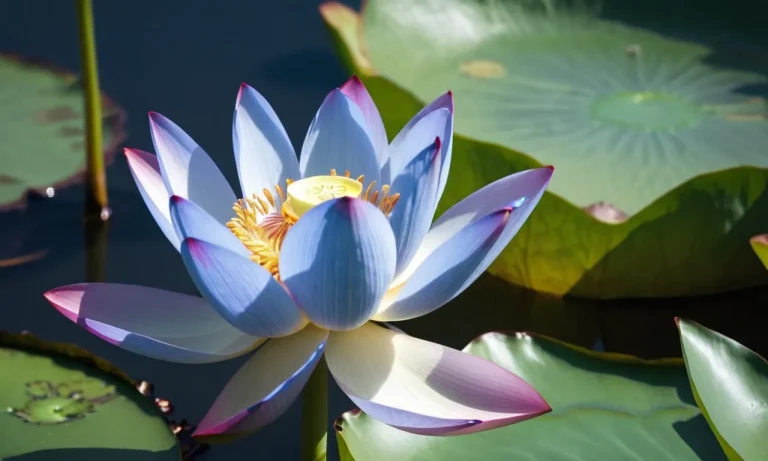Do you ever find yourself feeling anxious or worried for what seems like no reason at all? Many people experience anxiety from time to time, even if there are no apparent triggers. If you’re looking for a quick answer: experiencing anxiety without an obvious cause can have spiritual significance related to inner turmoil, blocked energy flow, or misalignment between your thoughts and true purpose.
By exploring the deeper spiritual meaning, you can get to the root of your anxiety and rediscover inner peace and balance.
In this comprehensive guide, we’ll explore the potential spiritual reasons behind anxiety that seems to come from nowhere. We’ll look at how this type of anxiety relates to struggles between the ego and the Higher Self, energy blockages, as well as intuition and premonitions.
Most importantly, you’ll discover positive, spiritually-oriented steps you can take to relieve anxiety, realign with your Higher Purpose, and restore balance and serenity in your life.
The Role of the Ego in Creating Anxiety
The Ego Clings to Control and Predictability
The ego is the part of us that identifies with our self-image, status, possessions, roles, and beliefs. It craves control and predictability to feel safe. When life feels chaotic or uncertain, the ego tends to react with fear and anxiety.
For example, if we face an unexpected challenge like losing a job or getting sick, it threatens the ego’s sense of control. Or if we go through a major shift in identity or beliefs, the ego struggles to adjust, triggering anxiety about the unknown.
Spiritual teacher Eckhart Tolle notes, “The ego loves to emphasize the ‘otherness’ of people and nations.” Creating separation fortifies the ego’s identity. But this illusion of separateness also stokes anxiety, because at some level we feel disconnected from our shared essence.
Spiritual awakening asks us to embrace connection over separation.
Spiritual Awakening Can Trigger Ego-Based Anxiety
The process of spiritual awakening often stirs up anxiety initially. As our consciousness expands beyond the ego, we glimpse exciting new dimensions of being. But the ego feels threatened by this transcendence. It worries it will lose relevance or even disappear completely.
Ego death – the dissolution of our narrow self-concept – is the ultimate threat to the ego’s survival.
So the ego often sabotages spiritual progress by creating doubting thoughts, blame, control drama, and distress. It tries to keep us stuck in spiritual kindergarten, distracted in egoic reaction rather than responding consciously.
Knowing the ego’s role here allows us to navigate this challenging terrain with more compassion and less judgement.
Learning to Let Go and Trust the Higher Self
How can we transform ego-based anxiety into spiritual freedom? By consciously releasing ego identification and resting into higher awareness. Spirit guides us to surrender what we cling to – self-images, expectations, need for certainty and control.
As we let go, we reconnect to our Higher Self which exists beyond fear. We realign to higher will instead of forcing personal agendas.
This surrender process takes deep trust. Fortunately, intuition and synchronicity assure us we are guided. When we release limiting ego beliefs and align to love, doors open we couldn’t have imagined. We uncover grace, belonging and creativity we had overlooked.
Each surrender leads us home – to presence beyond anxiety. We awaken to the sacred within and all around us.
Energetic Causes of Unexplained Anxiety
Stagnant or Blocked Energy Flow
When energy flows freely through the body, we tend to feel calm, centered, and at peace. However, when our energy flow becomes stagnant or blocked, perhaps due to stress, poor diet, lack of exercise, or simply holding on to tensions, it can manifest as feelings of unease, restlessness, or anxiety for no apparent reason.
Opening up the energy channels through practices like yoga, meditation, or energy healing modalities can help reestablish balance. One study found that a regular yoga practice reduced anxiety scores by 34% and significantly improved energy levels.
Absorbing Others’ Stress and Negative Emotions
Some people are extra sensitive to energies around them and can absorb the stress or difficult emotions of others. This can overload their own energy system and cause unexplained anxiety attacks. If you suspect you might be an “empath,” be mindful of removing yourself from dense environments when needed and practice energetic cleansing techniques like meditation, breathwork, or envisioning your aura filled with bright, glowing light to release any stuck energies.
The Impact of Geopathic Stress and Electromagnetic Fields
Some researchers believe factors like geopathic stress zones in the earth or strong electromagnetic field (EMFs) from cell phones, WiFi, etc. can disturb the body’s energy balance and auric field leading to anxious feelings for sensitive individuals.
Strategies like turning off devices in the bedroom, walking barefoot on the grass, or moving your bed away from EMF-emitting electric boxes can make a surprisingly big difference.
| Factor | Potential Impact | Mitigation Strategies |
|---|---|---|
| Geopathic Stress Zones | Disruptions to auric field leading to anxiety, fatigue, insomnia | Test home for anomalies, move bed/chair, grounding practices |
| Electromagnetic Fields (EMFs) | Overstimulation causing nervous system imbalance | Minimize exposures from devices, EMF protection tools |
Premonitions and Intuition as Sources of Anxiety
Anxiety as Warning of Future Challenge or Opportunity
Anxiety can act as an intuitive warning system, alerting us to upcoming challenges or opportunities. It arises when our subconscious senses something that our conscious mind hasn’t registered yet. Research suggests intuitive people have a more active right brain hemisphere, which governs creativity and our “inner compass” wisdom (1).
Rather than dismissing anxiety as meaningless, we can reflect on what unprocessed experience our emotions might be picking up on. There may be major changes ahead in our relationships, work, or community that could spark anxiety.
By reflecting from a grounded place, we may gain insight into skillful responses. As the saying goes, “Worry often gives a small thing a big shadow.” Given time, we often find the source of worry wasn’t that impactful after all.
Developing Discernment Around Intuitive Insights
How do we discern between true intuitive insights that call for preparation versus anxious projections about the future? Developing spiritual insight through practices like meditation can sharpen self-awareness (2).
As we center in the present, anxiety loosens its grip and we can tune into guidance bubbling up from inner stillness. Consider reflecting on anxious thoughts that arise in a journal or with a spiritual friend to get grounded perspective.
Anxiety may point to needed conversations or amends still to be made. Our intuition affirms next steps, without constricting our energy through worry.
Learning to Stay Present Rather Than Projecting Into Fear of Future
Rather than fixating on the fearful stories our minds spin about the future, we can use the energy of anxiety to propel action in this moment. Making a list of productive tasks and taking one step at a time keeps us focused in our center.
Spiritual practices help too – prayer reconnects us to the sacred, while mindful movement grounds anxious energy in the body. As thought pioneer Dale Carnegie said, “Do the hard jobs first. Then the easy ones will take care of themselves.
“ Tackling anxiety-provoking tasks makes the future feel less heavy. Each conscious choice to show up and give our best – without judgment about outcomes beyond our control – unravels anxious projections. We discover confidence in living purposefully now.
Spiritual Self-Care for Soothing Anxiety
Meditation and Conscious Breathing
Meditation and conscious breathing are evidence-based ways to soothe anxiety and reconnect with your inner stillness (according to UCLA Mindful Awareness Research Center). Start with just 5-10 minutes per day focusing on your breath or a mantra like “peace”.
Apps like Calm or Headspace offer great guided meditations too. Over time, you’ll likely notice your anxious thoughts becoming less intense and frequent. 🧘♀️
Spending Time in Nature and With Spiritually Nourishing People
Being in nature is profoundly healing for the soul. Studies show that spending just 20 minutes outdoors can lower cortisol levels (your body’s stress hormone). Make an effort to spend quality time in nature often – going for walks, sitting by water, stargazing etc.
Connecting with spiritually uplifting friends who don’t drain your energy is vital too. Share your spiritual journeys, have deep heartfelt conversations, pray together or enjoy fun nourishing activities. 💕
Exploring Creative and Joy-Sparking Hobbies
Tap into your creative side! Artistic hobbies like painting, pottery-making, or playing music engage the right brain and can shift you into a peaceful, timeless state. The creative process awakens joy. Studies reveal that crafting lowers cortisol and anxiety levels by 26%.
Other enjoyable stress-busting activities include baking, gardening, journaling, photography, dance and volunteering. Explore different hobbies and commit time for those that spark the most joy! 🎨
When to Seek Additional Help for Anxiety Relief
Working with a Spiritual Counselor or Healer
Seeking support from a spiritual counselor or healer can be hugely beneficial when looking to find inner peace and relief from anxiety. These professionals can provide guidance to help get to the root of anxious feelings using mind, body and spirit techniques.
Some signs it may be time to connect with a spiritual counselor include:
- Feeling overwhelmed by anxious thoughts on a regular basis
- Struggling to pinpoint the cause of anxiety or worrying
- Having anxiety or panic attacks that disrupt daily activities
- Finding temporary relief from anxiety but the feelings consistently return
Spiritual counselors use holistic techniques to promote healing such as:
- Meditation and visualization exercises to calm the mind
- Breathwork and yoga to release emotion stored in the body
- Journaling to bring unconscious thoughts to light
- Energy work like reiki to unblock stagnant energy
Some counselors will also look at aspects like nutrition, sleep hygiene and lifestyle habits as part of a whole-person approach. Their goal is to get to the root of anxious patterns and thought loops so that sustainable inner peace can be achieved.
Considering an Integrative Health Approach Including Therapy and Medication
For some, working with a spiritual counselor alone may not be enough to find anxiety relief. This is where considering an integrative approach comes in – one that combines both traditional and complementary techniques as needed on an individual basis.
Signs that a multifaceted approach involving therapy and/or medication may be required include:
- Debilitating anxiety that severely impacts work, relationships and overall wellbeing
- Panic attacks, phobias or obsessive thoughts that are extremely difficult to manage solo
- Physical anxiety symptoms like rapid heartbeat, nausea or disorientation
- A personal or family history of mental health conditions
The most commonly used interventions alongside spiritual counseling are:
| Psychotherapy | Working with a therapist trained in anxiety treatment using CBT, mindfulness, EMDR or other evidence-based techniques |
| Medications | Anti-anxiety meds like SSRIs or benzodiazepines prescribed by a doctor or psychiatrist |
| Lifestyle Changes | Diet, exercise, sleep and stress reduction protocols to help minimize anxiety triggers |
Taking an integrative approach allows various tools to be used simultaneously to address anxiety on multiple fronts. Relief occurs more readily when mind, body and spirit facets are all supported.
Conclusion
Feeling anxious without a clear trigger can leave you feeling frustrated, confused, and searching for answers. By exploring potential spiritual roots like energetic blockages, ego struggles, and intuitive insights, you can get clarity on what you need in order to rediscover calm and joy.
An integrative approach that addresses physical, mental, emotional, and spiritual aspects of anxiety can help you get to the root causes. Along with spiritual self-care like spending time in nature and meditation, working with a counselor, healer, or health professional allows you to create an individualized plan for lasting relief.
With greater awareness and the right support, you can move through unexplained anxiety to emerge renewed, realigned, and at peace.






